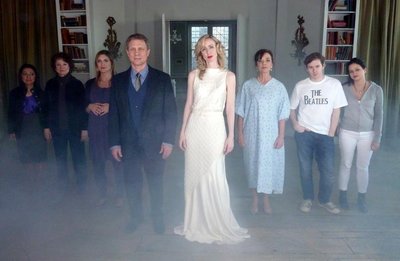When Weehawken singer and actor Frankie Keane got the call in 2008 from CBS’s V.P. of Late Night Programming Vinnie Favale to audition for his musical “Hereafter,” the phrase “life imitates art” turned out to be more suitable to her circumstances than the usual adage, “art imitates life.”
“Hereafter” began when Favale tried to write songs exploring the concept of the afterlife. He’d read an article about an 18-year-old killed as a passenger in a drunk driving accident. In its current form, “Hereafter” tells the tale of those attempting to reconnect with their loved ones with the help of a psychic.
Favale’s songs eventually became the beginnings of a play, which is when Favale contacted Keane to fulfill the role of Anita, an actress from the 1940s who dies in a plane crash. After hitting it off over the phone, Favale invited her to his shore house.
“I’m sure he invited me to make sure I wasn’t a cow,” she said. “When I got out of the car, Vinnie looked at his wife and said, ‘Thank God.’”
Not only does Keane cut a tall, ethereal figure herself, but she is no stranger to loss, nor to the attempt to reconnect with those who have died. She lost her mother and two brothers at a young age, and only last month, she also lost her stepmother.
“She was the sweetest person, and now my dad’s coming to the show, and you can imagine how hard it’s going to be for him to watch these people trying to connect with their loved ones who’ve passed on,” Keane said. Her father is planning to attend the musical, which premieres in Manhattan on April 24.
Psychic inspiration
Keane’s familiarity with death has greatly influenced her written and musical collaboration with Favale on “Hereafter,” she said. Her experience with psychic and medium Bob Garner, whom she met at a trade show in New Orleans and whom she introduced to her father recently, informs her uncanny ability to relate to the musical.
“This medium blew my socks off,” she said. She was initially skeptical, but that eased when Garner began speaking Korean to a family hoping to connect with their departed loved ones. Garner did not know Korean.
As Keane observed from afar, Garner suddenly zeroed in on her and said, “Do you want to do this?” He asked her to write down who she wanted to contact (she wrote her mother), and Garner said, “Your mom has a lovely accent.”
Keane’s mother was Irish, accent and all.
“I was a hot mess,” she said. But after this and a prolonged series of further beyond-coincidental interactions, she was convinced.
“Tomorrow’s not promised. The body is temporary and I know we have a soul,” Keane said. “I do get upset when people die, but I find I’m recovering a lot quicker because I know I’m going to see them again, you know?”
“How people mourn and how people grieve are very complex issues.” – Frankie Keane
__________
More than just a pretty (dead) face
Though Keane was initially enlisted in the project as an actor, her background in vocal arranging and gospelish, ‘no-way-you’re-a-white-girl’ singing style begged for a more integral part in the shaping of the musical.
“As Vinnie and I spent more time together, we realized I had much more to offer, which was my music,” Keane said. The two became partners, and she arranged all of the vocals.
One day while the two were sitting in Favale’s office, he said the play needed another song – a tango. Keane started humming, they went back to their respective corners, came up with some lyrics, got together with the show’s initial musical director Bill Hinden, and after a “knock-down, drag-out fight,” Keane said, the “Toe-Tag Tango” was born.
Art mimics life mimics art
In “Hereafter,” three women who have lost people close to them visit a world-renowned psychic named Jason (a name not dissimilar to Bob) to try and connect with them.
“What’s interesting about the musical is that you also get to meet the spirits on the other side,” Keane explained, “and they are struggling just as much as the living, because they are afraid to cross over.”
What’s keeping them from crossing over is the need for their families to get in touch with them. The minute they connect is the minute they can go to the “hereafter.”
The play addresses the presence of both selfishness and selflessness in loss, grieving, and closure. “How do you say goodbye?” Keane asked. “How people mourn and how people grieve are very complex issues.”
The play is set to premiere on April 24 and will run through May 5 at Theatre 80 in St. Mark’s Place in Manhattan. For more information, visit www.hereaftermusical.com.
Characteristic of her stalwart and optimistic humor resulting from a repetitive and honest confrontation with death, Keane joked, “Wouldn’t it be funny if I died in a plane crash before?”
Gennarose Pope may be reached at gpope@hudsonreporter.com.
